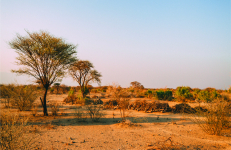The ARLI: an environmental, economic and social initiative

By Dr Ibrahim Assane Mayaki
Africa is facing huge difficulties to ensure food security, water and energy for decades to come, while watching the protection of essential ecosystems which are vital for its population. Thus I am pleased with the initiative launched by the NEPAD on December 6th 2015, right in the middle of the COP21: the ARLI (African Resilient Landcapes Initiatives), in partnership with the World Bank and the World Resources Institute. This initiative had been approved by the African Union in October 2015.
The objectives are broad and numerous: to improve access to drinkable water, to fertilize grounds and secure foodstuffs, but also to fight desertification, to increase biodiversity and to create green jobs. Many goals then, whose implementation is linked to the restoration of forests and ecosystems, the preservation of biodiversity, smart agriculture and sustainable pastures management.
Challenges and opportunities relative to lands management and hydraulic resources in Africa are closely linked to the continent’s development objectives, and in particular to an effective governance. This is a sine qua none condition for the economic and social well-being of African people and nations. Accordingly, we can easily affirm that the way lands and hydraulic resources in Africa are managed will determine the success or the failure of all development initiatives, whether they result from a government, from a development partner or from a civil organization.
It is also important to notice that an incredible energy is currently deployed to solve all these problems, the ultimate objective being obviously to realize the sustainable development of Africa. The evolution of the landscape is a perfect illustration of this mobilization in Africa but also throughout the world. Indeed, the ARLI is not an isolated initiative: we will take advantage of existing partnerships such as the one with TerrAfrica and we will work with various platforms such as the African Forest Landscape Restoration Initiative (AFR100) whose main goal is to convince the African nations to restore 100 million hectares of degraded and deforested lands before 2030. The NEPAD and its partners will also implement the ARLI through the Action Plan for the African landscapes. This roadmap promotes the landscape governance, as well as research and funding through priority actions that gather not only every important actor on the planet but also every sector. The “landscape approach” is indeed known to be really helpful in promoting the inclusive use of natural resources, in particular land and water, as well as focusing on the social, economic and environmental welfare.
Thus, the ARLI is not only an environmental strategy but also an economic, human and social initiative. This is going to mobilize African countries as well as the economic partners so as to promote sectorial interventions and to collectively insure the integrity, the resiliency, the restoration and the sustainable management of the landscapes throughout the region. If the initial objective of the program is sub-Saharan Africa, I wish it were extended to the world in order to create synergies and share experiences between regions.



